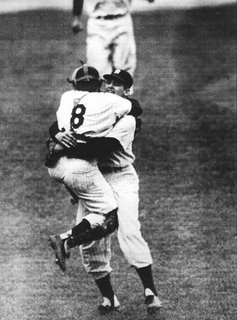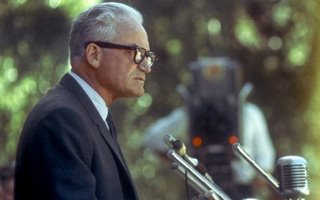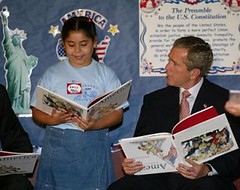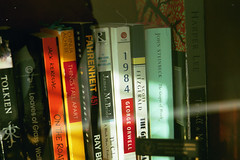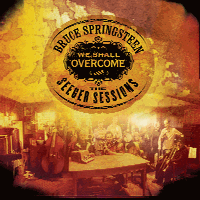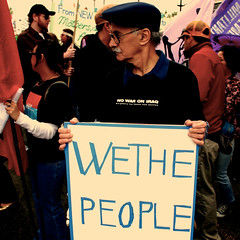
I reported a while back that my wife and I had gone on an Alaskan cruise in July, a first time experience for both of us. We had a great time traveling for a week from Seattle to Juneau and other ports, looking out upon the glacial beauty of the
Inside Passage. It was good for us in ways we had not imagined and it gave us time to talk about many things, some personal, some global.
We had long wanted to take a cruise but had not actively pursued it. Then one day back in January we were listening to
A Prairie Home Companion, a favorite radio show we tune in each week on NPR. An eclectic mix of music and comedy, the show stars
Garrison Keillor, a funky philosopher/writer/musician who stirs his homespun tales into a tasty stew of cultural commentary, political satire, and poignant slices of life. The music is in many ways the heart of it and it comes from many directions--country, jazz, pop, folk, even classical at times.
Listening that day we discovered that Keillor and his show had chartered a ship and were taking a cruise with 1500 or so listeners of the program. The convergence of a Holland America cruise line and A Prairie Home Companion theme was something we couldn't resist. We signed up.
It isn't often that one can experience the wisdom of the prairie in the vast open waters of the sea. But people from diverse backgrounds formed community, became friends, talked about shared values and sometimes about conflicting ones. On this huge ship with its grand dining room and spacious lounges we found ourselves thinking at times about the simple, yet important things. In the lavish comfort of a luxury cruise line there was still opportunity to ponder the deeper human questions.
Even so, we could not fully escape the world's realities. As we walked the deck or sat comfortably in chairs looking out to the sea, the frightening sounds of air raid sirens and incoming missiles played hauntingly through television speakers as CNN broadcast continual coverage of the war in Lebanon and Israel.
But through it all it was the music that provided the zestful foundation of what happened that week, pulling us from our inbred rationality and luring us to dance. The lyrics were sprinkled liberally into the stew, some of them words that might suck desperately for life if spoken, but miraculously gave life when sung.
I know there are moral complexities here. It's easy for people who can afford a cruise to talk about a needy world while eating an elegant five course dinner. The irony is not lost on me, nor has it been in the past when I have had to balance what one sees during many trips into the developing world with the fact that I wanted my own kids to go to college and have a good life, something impossible in many cultures.
 But still... I continue to believe that something redemptive does happen when one takes a slice of the prairie to the glacial beauty of the sea. Nothing gets resolved, to be sure. But Powder Milk Biscuits and Lutheran guilt and news from Lake Wobegon (all concepts very familiar to APHC listeners) have something to contribute to the dialogue that must occur in this broken, yet beautiful world.
But still... I continue to believe that something redemptive does happen when one takes a slice of the prairie to the glacial beauty of the sea. Nothing gets resolved, to be sure. But Powder Milk Biscuits and Lutheran guilt and news from Lake Wobegon (all concepts very familiar to APHC listeners) have something to contribute to the dialogue that must occur in this broken, yet beautiful world.
If the prairie can come to the sea just imagine what else is possible. The city to the farm? The rich to the poor? The gay to the straight? The pit bull to the cocker spaniel? The Muslim to the Christian?
It makes one want to climb aboard the ship of human hope, sprinkle in some music, break bread at a common table, tell some stories, and talk about where we've each come from, what we've each seen and heard. Maybe then we can come to know something of each other. In that way, through our shared stories, the prairie truly could talk to the sea, and likewise the sea to the prairie. What a world that would be!
All aboard?
Technorati Tags: cruises peace community
 In my previous blog, written on Christmas day, I waxed eloquent about how our family had made our traditional Christmas brunch the still point in our changing world. I wrote about how our sons want the menu to be precisely the same as it has always been, and that though we were spending Christmas in a new locale nothing would change our brunch. I ventured to say that there was something virtuous and meaningful about all of this. I declared that some things never change. And I inserted a resounding "Hallelujah!"
In my previous blog, written on Christmas day, I waxed eloquent about how our family had made our traditional Christmas brunch the still point in our changing world. I wrote about how our sons want the menu to be precisely the same as it has always been, and that though we were spending Christmas in a new locale nothing would change our brunch. I ventured to say that there was something virtuous and meaningful about all of this. I declared that some things never change. And I inserted a resounding "Hallelujah!"



